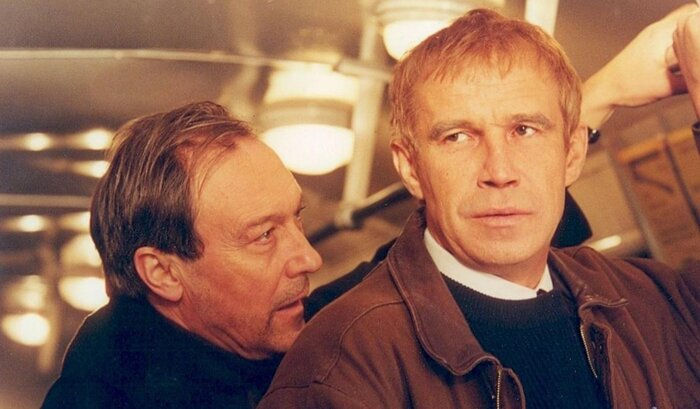The visual constant of Todorovsky's dramaturgy
- eliseeva-maria
- Oct 13, 2021
- 4 min read
Updated: Oct 15, 2021
"Lover" by Valery Todorovsky (2002)
*Russian version is below*

The film "Lover" begins with the death of the protagonist's wife. We do not see her face, and the director's intention is more than justified - after all, even her husband did not really know her.
The dramaturgy of the film lies in the disappointment of a loved one. What is it like to be betrayed? And who really died at the time of his wife's death? Her or her betrayed husband who only learned the truth after her death?
The distortion of the reality of the main character (Oleg Yankovsky) is the main plotline of the film. The rapprochement with his main enemy - his wife's lover - is the paradigm for the rest of his life. Rethinking his path is what the hero comes face to face with. However, this is too heavy a burden for the romantically devoted hero. He cannot part with his wife, nor with the sense of grief over her death, nor with the anxiety that has consumed his life. The unclosed gestalt of conversation with his wife, the unspoken and unanswered question of "why?" drives Dmitri (Oleg Yankovsky) mad. He discovers that his life has been filled with lies from the people closest to him and that everything he thought belonged to him has turned out to be just an illusion of involvement. The absolute tragedy of one man.
Dimitri clings hopelessly to his past life, to any details of his wife's secret life. He repeats her fate: he sees Ivan (Sergei Garmash), walks the same route, suffering the same uncertainty. False discovery of a "friend" in the person of the husband's lover only aggravates the Dmitriy's condition, he transfers the wife's significant subject onto Ivan. And now he is dependent on him: on talking to him, figuring things out, making simple connections. But only Ivan is not so obsessed. Eventually he copes with the pull of the past and his love for Dmitri's wife. He leaves, leaving behind a suitcase of records, which is just a metaphor for his past love affair. And disappears.
Dimitri, not finding Ivan in his flat, is once again experiencing a grief-stricken loss. His wife's lover has become, as it were, his new wife, and the break with him means loss of his connection to his life. So the protagonist takes the same tram again, taking the same route, but at the fifth stop he does not get out - probably a heart rupture. He dies of grief and betrayal.
A visual constant in the film can be considered as "life of the hands": Todorovsky resorts several times to a close-up of the hands first of the dead wife, then of Dmitri, as if linking their life paths, and, in fact, the path of deception.
The film is beautiful in its tonal mood: a realistic grey colouring, the ubiquitous smoke of cigarettes, the understated range of bright colours.
"Lover" by Todorovsky is a hymn to disappointment and betrayal, to betrayed love and despair. The film "Lover" is a living organism that experiences personal drama. It resonates in the viewer's heart because it is real and sad.
Визуальная константа драматургии Тодоровского
«Любовник», Валерий Тодоровский (2002)

Фильм Любовник начинается со смерти жены главного героя. Ее лица мы не видим, и эта задумка режиссера более, чем оправдана - ведь даже ее муж не знал ее по-настоящему.
Драматургия фильма заключается в разочаровании в близком человеке. Каково это - быть преданным? И кто в тот момент смерти жены действительно погиб? Она или ее преданный муж, только после смерти узнавший правду?
Искажение реальности главного героя (Олег Янковский) - главная сюжетная линия фильма. Сближение с главным врагом - любовником жены, это парадигма дальнейшей его жизни. Переосмысление своего пути - вот, что встречает герой лицом к лицу. Однако, это слишком тяжелая ноша для романтически преданного героя. Он не может расстаться ни с женой, ни с ощущением горя от ее смерти, ни с тревогой, поглотившей его жизнь. Незакрытый гештальт разговора с его женой, недомолвки и безответный вопрос «почему?» сводят Дмитрия (Олег Янковский) с ума. Он узнает, что его жизнь была наполнена ложью близких ему людей, а все, что он думал, принадлежит ему, оказалось лишь иллюзией причастности. Абсолютный трагизм одного человека.
Дмитрий безнадежно цепляется за прошлую жизнь, за любые подробности тайной жизни жены. Он повторяет ее судьбу: видится с Иваном (Сергей Гармаш), ходит по тому же маршруту, так же мучается от неизвестности. Ложное обретение «друга» в лице любовника мужа только отягощает состояние Дмитрия, он переносит значимый субъект жены на Ивана. И теперь зависим от него: от разговоров с ним, выяснения отношений, простой связи. Но только Иван так не одержим. В конечном итоге он справляется с тягой к прошлому и своей любовью к жене Дмитрия. Он уходит, оставив чемодан с пластинками, который как раз является метафорой его прошлой любовной привязанности. И пропадает.
Дмитрий, не находя Ивана в его квартире, в очередной раз испытывает горестную потерю. Любовник жены как бы стал его новой женой, а разрыв с ним означает потерю связи со своей жизнью. От того главный герой опять садится на тот же трамвай, едет по тому же маршруту, но на пятой остановке не выходит - вероятно, разрыв сердца. Умер от горя и предательства.
Визуальной константой в фильме можно считать «жизнь рук»: Тодоровский несколько раз прибегает к крупному плану кистей сначала умершей жены, потом Дмитрия, как бы связывая их жизненные пути, и, собственно, путь обмана.
Фильм прекрасен тональным настроением: реалистичным серым колоритом, повсеместным дымом сигарет, сдержанной гаммой ярких цветов.
«Любовник» Тодоровского - это гимн разочарованию и предательству, преданной любви и отчаянию. Фильм «Любовник» - это живой организм, который переживает личную драму. Он откликается в сердце зрителя, потому что он настоящий и печальный.





Comments